Errors & Omissions Excepted
E&OE is used when a large amount of information is listed to state that—to the best of the supplier’s knowledge—the information is correct, but that they will not be held responsible if an error or ommission has been committed.
Quick Navigation – Table of contents
- Why Do Computers use 1’s & 0’s?
- A brief history of search engines
- 1989 – ‘Archie’ [The Grandfather of all search engines]
- 1993 – ‘Veronica’ [The Grandmother of search engines]
- What are the types of keywords
- On-site / off-site SEO
- The Wealthy Affiliate approach to keywords
- Low-hanging fruit keywords
- Go after low-hanging fruit – [Video – Run Time 17.53] Creating a demo account required to view the video.
- What is ScamDoc
- The Jaaxy keyword research tool – Review
Why Do Computers Use 1’s and 0’s?
Binary and Transistors Explained.
What are Keywords & are they important to SEO?
.In terms of SEO (Search Engine Optimization), keywords are the words and phrases that people ‘ search or surf for ‘ on the Internet when they are looking for something.
They enter into search engines like Google, Yahoo, and Bing.
SEO means optimizing our web pages for better ranking in search engine result pages (SERPs) for the Domains we own and are building.
Here is a link to the top 10 search engines according to Reliable Soft dot com.
Keywords can be many things but in their most simplistic and basic sense, keywords are merely ideas and topics expressed through words and phrases that define what content on the Internet is about, and how it can land someone into influence after a search.
As website owners and content creators, we strive to be relevant to what people are searching for so that the people doing the search have a better chance of finding what they are looking for.
Wealthy Affiliate started as a Keyword Research Site back in 2005.
Kyle Loudoun and Carson Lim launched Wealthy Affiliate as an initiative to help themselves to become aspiring online entrepreneurs and at the same time, teach others how to do the same. They started as Equal Opportunity Online Providers of keywords.
Since then they have created their own Keyword Research tool which is included in the Wealthy Affiliate membership or you can purchase it on its own for $49.00 USD per month or $495.00 per year.
Jaaxy offers a very lucrative affiliate program.

Click on the image above to sign up and get 30 free searches to test drive the Jaaxy keyword research tool
Keywords are important because they serve as the connection between search and find. They are as much about the audience as they are about the content being provided.
Understanding the needs of visitors, the language style they use, and the type of content they seek is crucial to receiving traffic to our sites.
The number of keywords we use when we write is probably irrelevant but the types of keywords we use, the order of the words, and their meaning can help us identify how close to home the information provided is.
Search engines use that information to determine content relevance to a particular search query, and how that content should rank for a particular search term.
More on Keywords from other online authorities:
Keyword Research: How to Do It, Tips, Tools & Examples – Neil Patel
Keyword Research: The definitive Guide 2022 – Brian Dean.
Related Viewing:
- What is the World Wide Web? [Video Run Time: 3.54]
- How does the Internet work? [Video Run Time: 8.58]
- How does your mobile phone work? [Video Run Time: 9.04]
A brief history of search engines
It’s hard to believe that Google is already over 20 years old. It is quite admirable how Google’s ever-changing algorithm continues to meet the ever-increasing demands of billions of searches from all over the world.
Google officially launched in 1998.
The Google story began in 1995 at Stanford University.
Larry Page was considering Stanford for grad school and Sergey Brin, a student there, was assigned to show him around. The rest is what we want to call it.
On a side note:
Late December 2019…
The police came for Dr Li Wenliang in the middle of the night on the first day of the year. Just days earlier, Li, a physician in Wuhan, China, had sent a message to his medical school alumni group on WeChat informing them that a cluster of patients with a strange new virus had been quarantined in the hospital where he worked.
Click on the image below to read a very interesting story.
1989 – The Grandfather of all search engines – Archie
“Archie” was the first search engine launched one year after the invention of the world wide web (WWW). This early search engine crawled through an index of downloadable files but was limited to only making listings available and not the content.
Archie was invented by Alan Emtage, a computer science student from Barbados studying at Mcgill University in Montreal, Quebec, Canada.
Archie was a contraction of the word ‘Archives,’ to fit the shortened naming conventions of the UNIX operating system and was designed to provide an online index of public FTP (file transfer protocol) sites.
At its peak, 30 Archie engines crawled the internet and by 1995 had catalogued millions of pages.
While FTP is still a common way to share files over the internet, Archie is no longer used. Archie was dubbed the grandfather of all search engines.
1993 – The Grandmother of search engines – Veronica
Veronica stands for Very Easy Rodent-Oriented Netwide Index to Computerized Archives. It has been dubbed as “ the grandmother of all search engines.”
By 1993, the popularity of Archie had grown to a notably large extent and prompted Steven Foster and Fred Barrie at the University of Nevada to develop Veronica to search for “Gopher” files.
Gopher was developed by Mark McCahill and his team at the University of Minnesota and was aptly named after the university mascot, the Golden Gopher.

Click on the image above to use the Gopher Search Engine. I gophered my name and my sites appeared on page 1. It still works.
Gopher was a protocol designed to search, distribute and retrieve plain-text documents from Internet Protocol networks. The Gopher ecosystem is often regarded “as the effective predecessor of the World Wide Web.”
The design and user interface was menu-driven and presented an alternative to the WWW in its early stages, but fell into disapproval and conceded to the HTTP (Hypertext Transfer Protocol).
“The Gopher protocol is still in use by enthusiasts, and although it has been almost entirely supplanted by the Web, a small population of actively-maintained servers remains.” –Wikipedia.
Today, Google and other search engines are smarter than ever—they use machine learning to help process and rank information, and can understand natural human speech. But the internet wasn’t always so easy to navigate! There was a time when you had to know the exact wording of a website’s title to find it. Search results were riddled with spam. Getting new content indexed by the search engines could take weeks to complete.
What are the types of keywords?
There is a mixed school of thought on how many types of different types of keywords there are from the ones I have listed below all the way to Commercial Intent Keywords, Transactional Keywords, Navigational Keywords and beyond.
So depending on where we look on the Internet, we will not find anything carved in stone but we will find lots of great ideas on the use of keywords.
In order to conduct thorough research in the arena of keywords, it is advisable to have a reliable ‘Keyword Research Tool.’
SEO and linking cool guy Brian Dean from Backlinko.com in his list of the 15 best keyword research tools in 2020 rated Jaaxy as number 3.
As a premium member of Wealthy Affiliate, the ‘Jaaxy Lite‘ keyword research tool is included. This version is more than enough to get started and just another reason to ‘Join’ Wealthy Affiliate and start building out your own real estate online.
His favourite feature is: QSR
I like it too.
QSR stands for “Quoted Search Result”.
This is a fancy way of saying: “how many other websites are trying to rank for this exact term?” Obviously, the lower this number, the better chance we have of ranking.
let’s have a look at what came up for Brian when he researched the term ‘Keto Diet.’
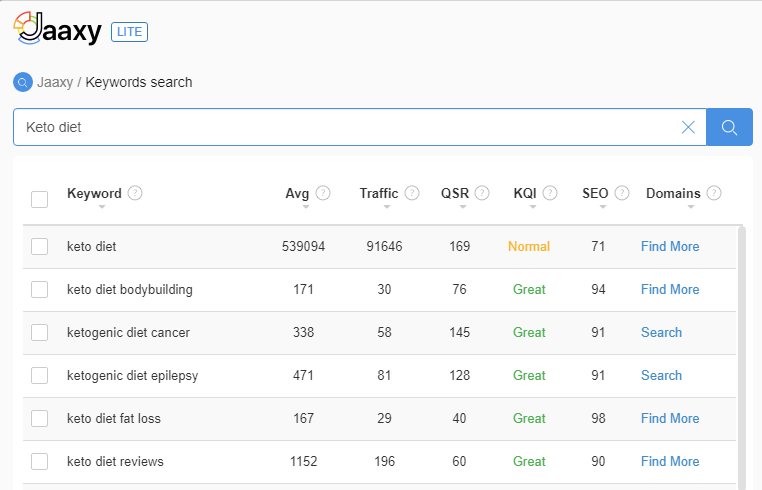
Lot’s of great ideas come up.
What do the columns mean?
- Keyword – Is the primary keyword that Brian is searching for. This column will also generate a list of other related targeted results that Brian did not think of immediately.
- Avg – Gives Brian the number of average monthly searches for each keyword result generated for his initial keyword. ‘keto diet’ has over 1/2 million searches per month, but is that his best choice?
- Traffic – Will tell Brian how much traffic he can expect if he is on the first page of the search engines for his chosen keyword.
- QSR – Quoted Search Results. This will tell Brian how many other websites are competing for the exact same keyword(s) he may want to choose. The lower the number, the lower the competition.
- KQI – Keyword Quality Indicator. This colour system gives Brian an overview of all factors related to the keyword(s). Green means it’s a good keyword with a very good chance of ranking. Yellow is an average keyword with lots of competition but because Brian has a lot of authority on the internet, this could work for him. If red shows up, this means that there is too much competition for that keyword. We can still make words in the red zone work for us based on how we use them.
- SEO – Search Engine Optimization Power 1-100 tells Brian how easily an optimized page or post will rank. Longer keyword phrases generally have higher power than short keywords because they are more precise. The higher the score here closer to 100, the better.
- Domains – this will tell Brian which domains are available for a specific keyword or keyword phrase. Exact ‘match’ domains still rank well in the search engines.
From the results in the table above, Brian has many different options to choose from. I would choose ‘keto diet reviews.’
![]()
And by clicking on “Find More,” I could find if related domain names are available.
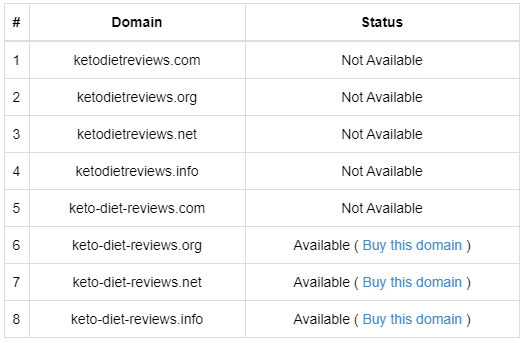
This is a very important tool to have in your toolbox for Internet Marketing. See for yourself by trying some searches for free below.
[Username and valid email required]
Try 30 Free searches below:
Forensic Affiliate Jaaxy Review
Join Wealthy Affiliate, become a Premium member and receive Jaaxy Lite for free.
Wealthy Affiliate Free Trial (No credit card or payment information required).
Generic Keywords or Research Keywords:
These types of keywords tend to contain only one or two words and although they have meaning, they are not specific. An example would be ‘Content’ or ‘Content Marketing.’ These types of keywords have a really high search volume but getting search rankings on the engines with them can be extremely difficult. Let’s do a search with Jaaxy and see what we get;


As you can see, by entering ‘content’ we also get ‘content marketing. There are lots of searches and you would receive lots of traffic but the competition for ranking is very high.
In the past, one of the aims of keyword research was to stuff our content with terms people were looking for and artificially push pages to the top of the search results. Quality of content was often seen as less important than the right keyword density – having a certain percentage of the same keyword within the content.
That kind of approach no longer works. In fact, it’s more often penalized than rewarded.
Google keeps tweaking how its search algorithms work to try to deliver search results more relevant to what people want to find.
- People are using mobile devices with digital assistants which allow them to search by voice. That means they are using natural language and asking questions, not just typing in search phrases.
- Google tries to bring up immediate answers to many queries via Answer Boxes. These are usually based on well-optimized, relevant content.
- Semantically related keywords are now a thing. You don’t just optimize content for a single target phrase, but for related phrases that mean basically the same thing.
Try some generic or research keywords for free here:
Informative Keywords:
Are keywords used by people who are looking for a direct answer to their search? An example would be ‘What is content marketing.’ With these keywords, people are seeking specific information perhaps in support of their idea of purchasing a specific product or service. Although these kinds of keywords probably will not bring us revenue, they can get the customer to us to be led further toward a sale.

The concept of content marketing has been around for hundreds of years, and the discipline has gained incredible popularity since the mid-2000s.
Create some Informative keywords here. It’s free.
Short-Tail Keywords:
Short-Tail Keywords are very similar to generic keywords but give just a little bit more detail of what the keyword is related to. For example, the term ‘Content Marketing’ is a generic keyword. By adding words like ‘training’, ‘service’ or ‘company’ to a generic keyword will result in short-tail keywords like ‘Content Marketing training,’ ‘Content Marketing service’, or ‘Content Marketing Company’.



As you can see in the screenshot above, by searching ‘content marketing training,’ ‘content marketing service’ also shows up with very favourable results
Create some short-tail keywords here:
Long-Tail Keywords:
The 3-4 (sometimes even more) words when combined together to form one keyword, known as a ‘Long Tail Keyword’ is used to target niche demographics rather than mass audiences. What this means is that they are more specific and usually less competitive than generic keywords.
Visitors are more likely to use long-tail keywords when they are closer to a point of purchasing or in some cases when they are using voice search.
Let’s say for example yours is a company that sells ‘Content Marketing.’ The chances of your pages appearing at the top of search engines for an organic search of ‘Content Marketing’ are probably quite slim. But let’s say you specialize in content marketing for start-ups. Then your chances of ranking at the top are much greater for the long-tail keyword ‘Content Marketing for Startups.’ Chances are that a start-up company looking for a content marketing company specializing in startups will enter that exact long-tail keyword.

As you can see from the keyword search results, ‘content marketing for startups’ would be a good post or article to rank for.
Now, look if that company was located in Austin, Texas. It is only logical that if that were the case, the search would be more geographical i.e. ‘content marketing companies in Austin Texas.’
Create some long-tail keywords here:
Geo-Targeted Keywords:
These types of keywords have a specific geographic location or area specified in the long-tail keyword phrase. An example would be “Content Marketing Companies in Austin Texas,” or even something like “Hardware Stores in Aspen Colorado.”
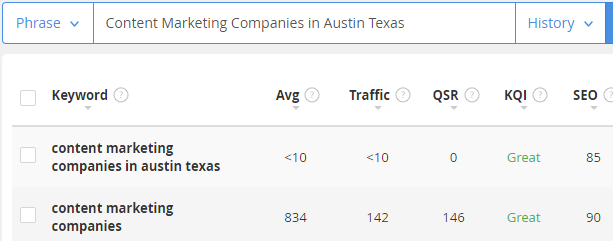
These kinds of keywords can come in really handy and become really lucrative when researched properly because oftentimes, you can get a match in a domain name of the same keyword (see below).

![]()

I personally like doing the research on these kinds of keywords because they can provide a lot of traction with getting local businesses to do business with me. More on this in a future post.
Create some Goe-Targeted keywords for free here:
LSI – Latent semantic keywords:
LSI (Latent Semantic Indexing) keywords are words that are commonly found alongside your target keyword. For example, if you were writing about “weight loss tips”, then you’d probably mention words like “nutrition”, “dieting”, “fat loss” etc.
“Nutrition”, “dieting”, and “fat loss” are LSI keywords.
When Google sees those words around your target keyword, it gives them confidence that you’re writing quality content.
Fortunately, it’s easy to find LSI keywords for any keyword. Just search for that keyword in Google and scroll to the bottom of the page where it says
“searches related to…”
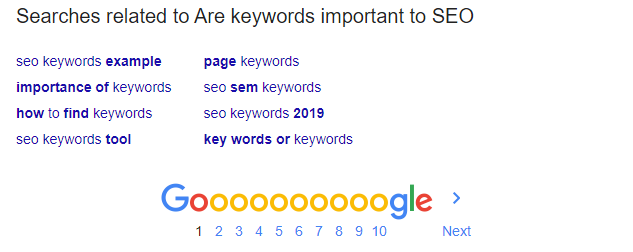
In the example above, I searched for the title of this post “Are Keywords important to SEO.” The words in bold blue in the example are LSI keywords and if I use some of them in the content that I am creating, then chances are Google will pick up on them.
On-site/off-site SEO
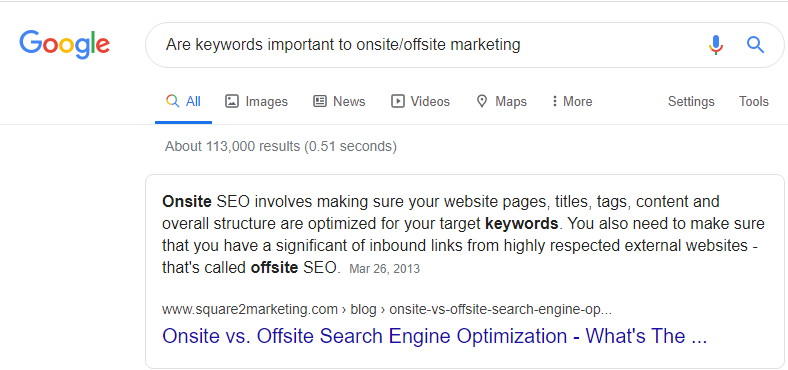
Are keywords important to onsite/off-site Internet Marketing?
The Jaaxy Keyword Research Tool is free to try. It is also free to Wealthy Affiliate ‘Premium’ members and is recommended for its ease of use, speed, and accuracy.
We also need to make sure that we have a significant amount of inbound links from highly respected external websites. These types of links are known as off-site links and they can be used as keywords also.
Learn more about onsite/offsite marketing here.
The Wealthy Affiliate approach to keywords

Here at Wealthy Affiliate University, we are taught that with our keyword and research efforts, our goal is to build a list of keywords that are relevant to our niche and then work with those keywords to rank them high on the search engines.
Google and other search engines exist because of the content that we provide and if we can deliver quality content, we are able to get great rankings. Finding the best keywords is not that easy and one of the most important tools that are required for anyone’s Internet Success is having a Keyword Research Tool.
Wealthy Affiliate makes it easy for its members because their Jaaxy Keyword Tool is included in the Premium Membership.
SEO Keywords and more importantly how to use them properly are essential for any of us to succeed online. Ultimately our goal is to bring visitors to our sites who will then convert into loyal paying customers. We want to be relevant to what people are searching for so we choose the right keywords because they serve as the connection between ‘search’ and ‘find.’
Low Hanging Fruit keywords
So what is a ‘Low Hanging Fruit’ keyword?
“Essentially a low hanging fruit keyword is a low competition keyword. Like a fruit tree, it is the fruit that is typically smaller (it gets less traffic), but there are many more of them and they have far less competition because most people naturally compete for the fruit at the top of the tree (the high traffic keywords).”
“The idea behind this approach is to get rankings. Sometimes with a brand new website, it is more difficult to get ranked under more competitive terms and we will be much better off targeting low competition keywords. In fact, this strategy can be used FOREVER…it is one that I use over and over again and it can lead to an unlimited amount of traffic.” – Kyle Loudoun.
Watch the Video Below presented by Kyle to Get an understanding of ‘Low Hanging Fruit’ and how to incorporate them into targeted rankings that will get us great search engine ranking results.
 
Go After The Low Hanging Fruit
Video Run Time: 17.53
Kyle explains that for a keyword to qualify as ‘Low Hanging Fruit,’ the main 2 things we should look for are the AVG to be over 30 searches and the QSR (competition) to be less than 100. See what these Jaaxy terms mean here. Again, there are different views on what these numbers should be, but we are just interested in the learning aspect at the moment and we’ll use the guideline offered as examples.
Research ‘low hanging fruit’ keywords for free here:
Up next will be a ‘Review’ of the Jaxxy keyword research tool. Before that though, I would like to introduce you to another tool that comes in really handy for actually doing reviews.
ScamDoc.
What is ScamDoc
Scamdoc is a free online tool that can help us to evaluate if a website or email is potentially dangerous to our pocketbook and overall online health. ScamDoc check’s to see if a website URL or email address is legitimate.
This site can be used by anybody who wishes to get some information before making a purchase or during an exchange with an unknown contact.
“ScamDoc uses a web service called ScamPredictor. It is an algorithm developed by HERETIC society (founder of Signal-Arnaques) which uses an artificial intelligence classification system. Just enter an email or a website URL to get a detailed report with a trust score!
Try it for yourself here or click on the ScamDoc image above.
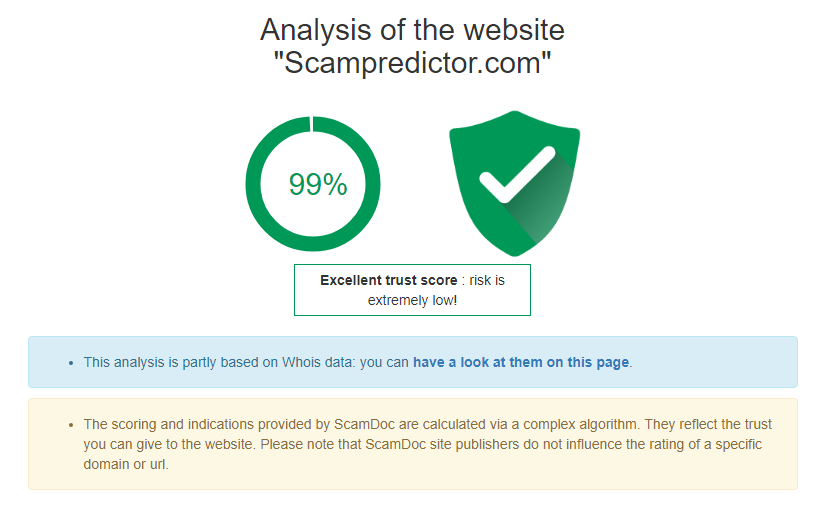
Scam Predictor is given an almost perfect rating. They also offer a free API (application programming interface).
You can try their free offer here.
The ScamPredictor API makes it possible to fight against scams by identifying the “digital profiles” at risk. It provides a confidence score for an email address or a website. See image above.
Data from several websites dedicated to scams are used making this predictive model one of the most powerful on the market.
Let’s put ‘Wealthy Affiliate’ to the test below.
Wealthy Affiliate Scamdoc Scan
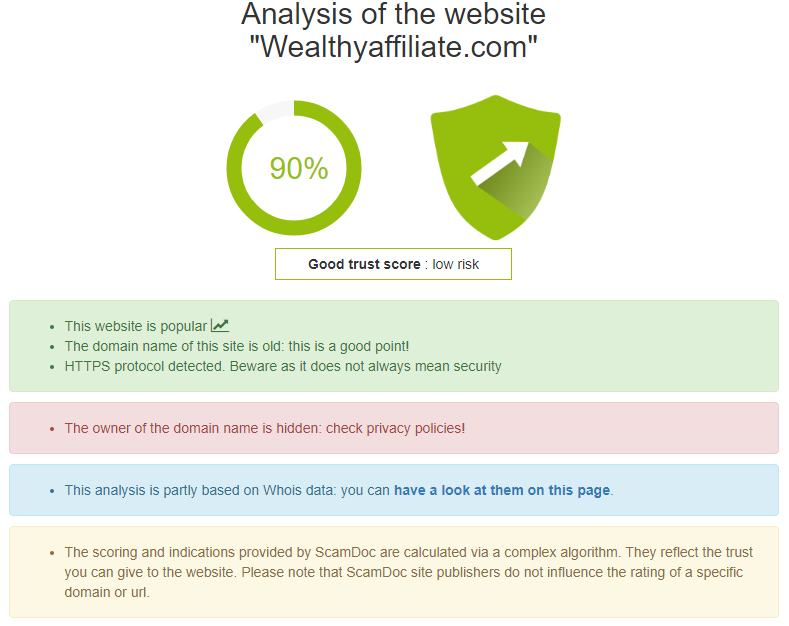
Wealthy Affiliate gets a 90% rating. The only reason why it is not higher is the fact that the owner of the site is hidden. However, this tool allows (or shows me) where I need to dig to get more information.
Here is the missing information below:
Wealthy Affiliate Operates As Niche Marketing Inc.
2354 Millstream Rd
Box 18
Victoria, BC V9B 6L2
Business Started: July 07, 2005
Business Incorporated: July 07, 2005
And you can meet the owners of this website here.
The Jaaxy keyword research tool – Review
Jaaxy became the official keyword research tool of Wealthy Affiliate in December of 2017. Click on the image to the left to read the introductory post by Carson Lim, Design Chief & Co-founder of Wealthy Affiliate.
Keyword and competition research can require a number of ‘hand’s on’ processes that are very time consuming when it comes to our efforts online.
Jaxxy gives us one of the most advanced, yet easy to use platforms in the world for managing all aspects of keyword, website, competition, and market research all under one roof.
It is estimated that there are over 500 million new search terms being searched every day which equates to billions of keywords. There are also literally millions of niches online, many of which have little to no competition. Whether we are looking for a new business idea or just looking to dig deeper into our existing niche, Jaaxy is going to be one of our power tools.
To beat our competition, we need to know more than them. The Jaaxy Keyword research tool allows us to spy on the competition and probe into why their websites are ranking and where they are ranking through insightful data into their website’s:
- Content structure;
- Meta tags;
- Content quality/length;
- Backlinks;
- Ad placements; and
other information that the competition does not want us to have. This information is our competitive edge.
Scamdoc Scan of the Jaaxy Keyword Research Tool
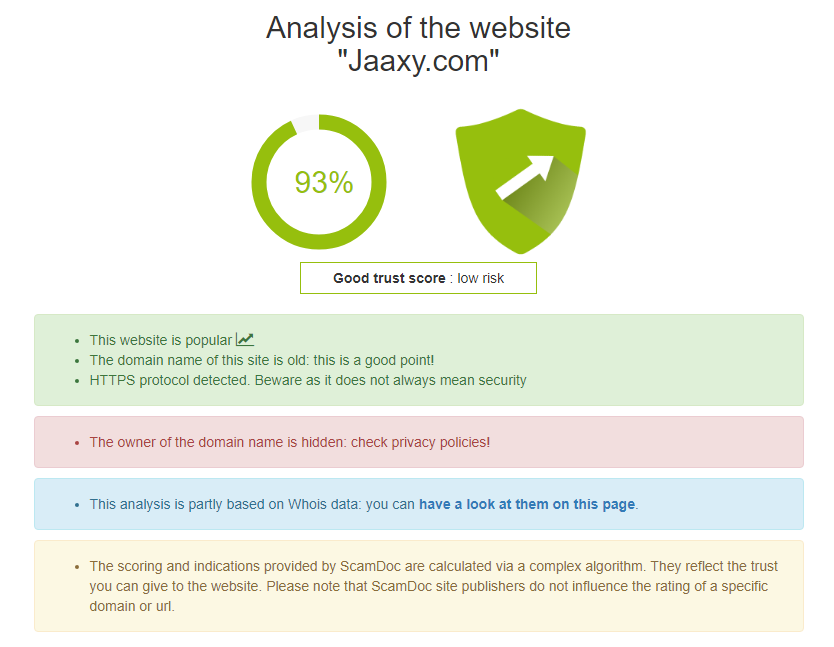
In the scan above, Jaaxy receives a 93% rating. Not bad. We are instructed to check the privacy policy of this domain name.
In doing so, we realize and learn in part that when this policy mentions “we” or “us,” it refers to the controller of our information under this policy.
The information is controlled by Jaaxy.
They operate as Sky City & Global Sync Marketing Inc.
Box 18, 2354 Millstream Rd
Victoria, BC, Canada V9B6L2
Product Name: Jaaxy Keyword Research Tool
Founders / Owners: Kyle Loudon and Carson Lim, the same two guys that started and own Wealthy Affiliate. Being leaders in the field of affiliate marketing, they have designed and continue to improve upon a tool that is both powerful and easy to use.
When it comes to finding keywords to use for articles or new websites, we at wealthy affiliate rely completely on Jaaxy and Google search for our keyword research. It is super easy to use and understand, plus the data is very accurate.
We may use Google every day without fully understanding the power of Keywords. Every time we do a google search, we are typing in keywords to find what we are looking for.
When we write content for our sites, keywords are ideas and topics that define what our content is about.
Jaaxy is a revolution in finding high traffic, low competition keywords for all types of online internet marketing.
By using data directly from Google and combining it with Jaaxy’s own proprietary data, the Jaaxy Keyword Research tool delivers results as we have never seen before.
Jaaxy does not need to be installed onto our computers and can be used by all skill levels of online marketers.
Let’s look at the membership options below.
Jaaxy Membership Options
Jaaxy – is the Research Platform Chosen by the Most Successful Entrepreneurs in the World. Below are the options for Non-Members of The Wealthy Affiliate Platform.
Please note that the Jaaxy Keyword Research tool is included in the Wealthy Affiliate Premium membership.
Special Pricing for Wealthy Affiliate Members:
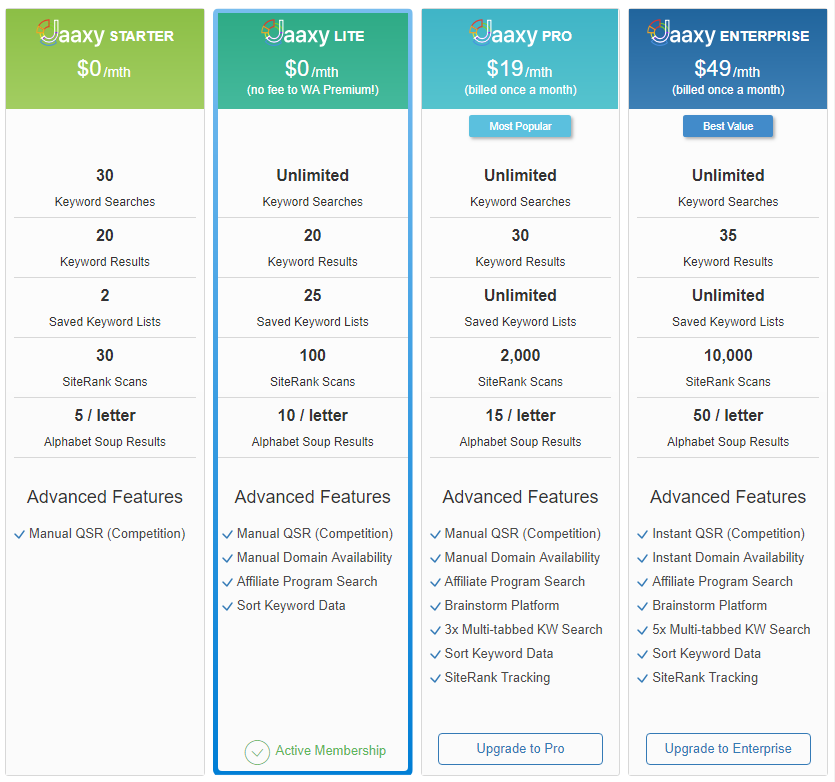
Jaaxy Starter.
This is an introduction to Jaaxy. We can get a taste of the power of Jaaxy with the Starter membership along with some features ranging from the Keyword Search, QSR (Competition Data), Domain Search, SiteRank, Keyword Lists, and the Alphabet Soup Platform.
Try 30 free Searches here.
Jaaxy Lite.
Jaaxy Lite is a new feature for existing Wealthy Affiliate Premium Members. This includes the same unlimited keyword searches that we have access to now with Premium and the WA keyword tool but comes with some extra Jaaxy features like SiteRank. It is a much better tool, a much more polished platform and it is integrated into our experience here at Wealthy Affiliate. Jaaxy Lite is included in the Wealthy Affiliate Premium Membership.
Jaaxy Pro.
This a powerful version of Jaaxy and the most popular among its users. It includes unlimited access keyword searches and much more robust access to SiteRank (to track our keyword rankings site-wide). Get access to the Jaaxy platform in its entirety and operate at 2x speed. It also includes a larger subset of search results than Lite and introduces us to “multi-threaded” search functionality which is great for those that like to multi-task.
Regular Price: $49.00 per month or $499.00 per year. (Non-WA Members)
Special Price for Wa members: $19.00 per month or $199.00 per year. This is a $300.00 per year saving for WA members.
Jaaxy Enterprise.
This is for the elite affiliate marketer and is an internet marketers dream keyword research platform. It is the best value, but it is also the most expensive. It’s great if you are an intermediate to an advanced online marketer, affiliate marketer, merchant, amazon seller, and local marketer.
It takes automation of SEO to a whole new level with SiteRank Tracking that allows us to automatically track our rankings in Google, Bing and Yahoo through the arc of time. This can be key for maximizing our SEO efforts and understanding what works and what doesn’t. If we want the fastest, most efficient, and best value platform Enterprise is it.
Regular Price: $99.00 per month or $999.00 per year.
Special Price for WA members: $49.00 per month or $499.00 per year. This is a saving of $500.00 per year.
Prices are in USD and do not include applicable sales taxes. (Commission Earnings Apply).
Try the Jaaxy Keyword Research Tool for free here.
What is the World Wide Web? Video Run Time: 3.54
Return To Related Learning.
How Does The Internet Work? Video Run Time: 8.58
Return To Related Learning.
How Does Your Mobile Phone Work? Video Run Time: 9.04
Comments – Make one or more.

Click on the image above to verify me at Wealthy Affiliate. I have been there since 2016. I like it.
Please feel free to click on my picture to the left to view my profile at my home base on the internet.
If you don’t have a website and would like to have as many as you want, then let’s learn how to do it by going here.
The customer journey entails different approaches customers take when they are searching online. It’s likely that customers will pass through a few stages on their journey before becoming loyal to any given brand.
Before making a purchase and showing their loyalty, chances are that they will do the following:
- They will first research to find the options available to them for what they are looking for;
- They will then consider the various options that they have found;
- Before making a purchase, they will weigh out their options to find the one that best suits their needs and provides the best value and results for their needs; and
- If they are satisfied with what has been delivered, only then will become loyal to a brand, product, or service.
What was the last purchase you made online?
Mine was an office chair.
- Where did you start and where did you end up?
- Did you purchase the same day that you started looking, and why or why not?
- Were you exposed to positive or negative advertising about a product?
- Did you see the product/service in a magazine or on TV before you saw it online?
- Was the price an issue for you, why or why not?
- What was the last phase in the analysis process before you actually purchased the product?
- Did you go on Facebook or Twitter for some purchasing guidance?
Let me know your thoughts.
Please leave a comment below in the comments section.
Thanking you in advance,
Paul Mindra for:

We covered Keywords and a specific keyword research tool.
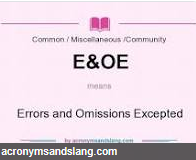



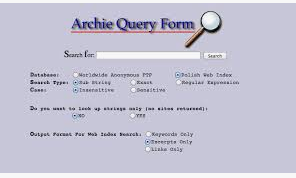
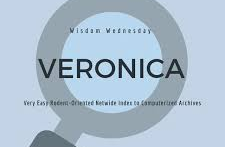
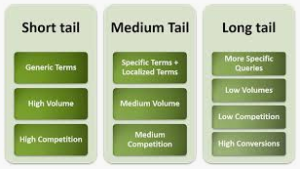

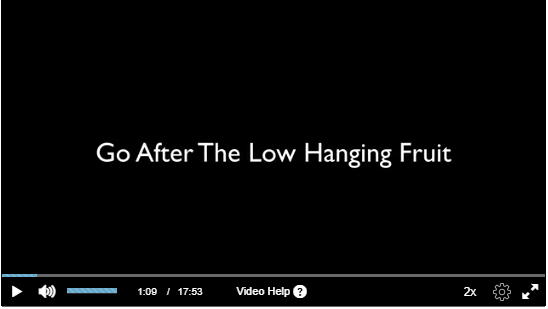
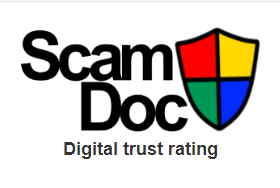
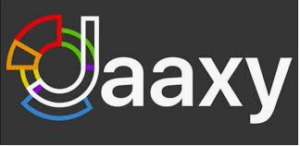
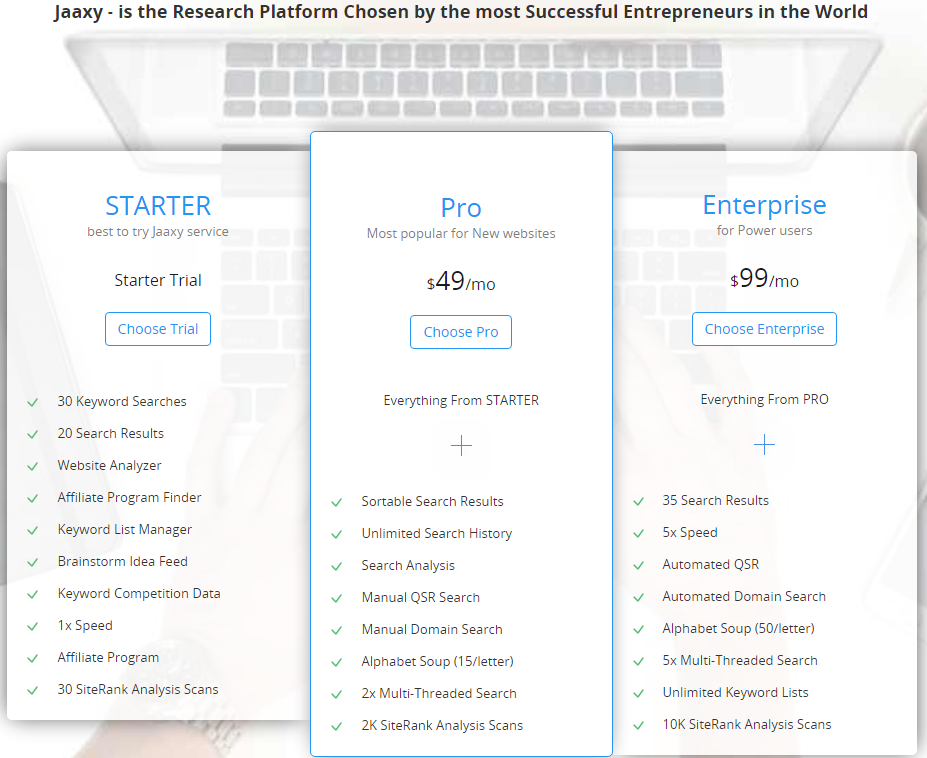
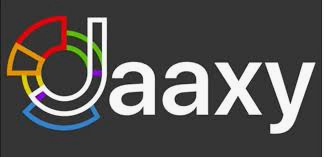
One Comment